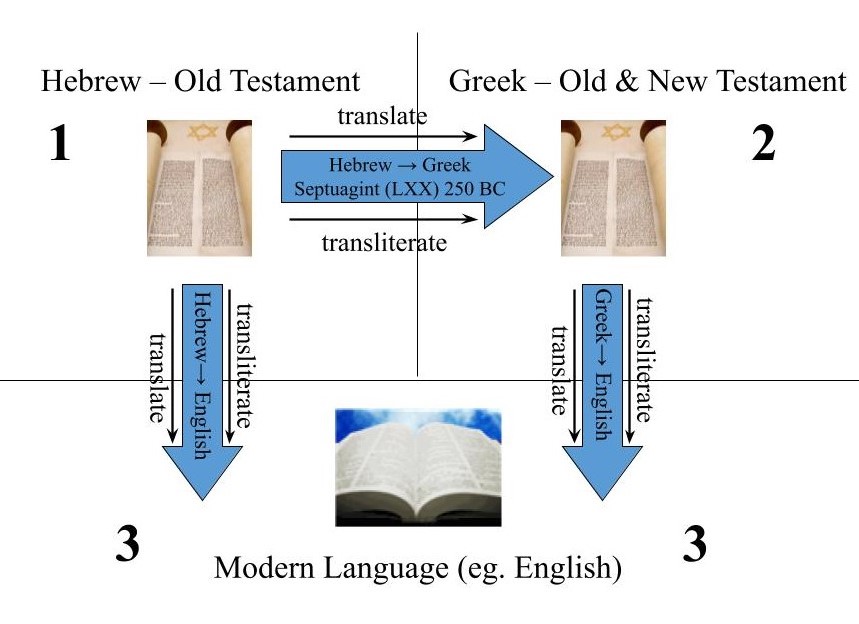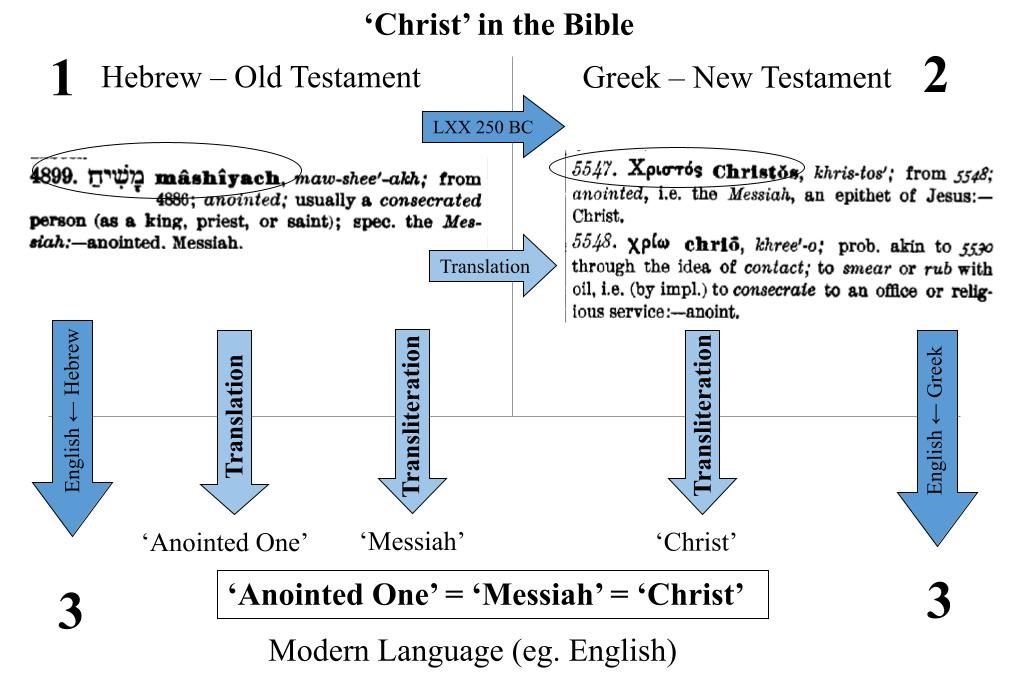I sometimes ask people, “What was Jesus’ last name?” Many answer, “I think it was ‘Christ,’ but I’m not sure.” Then I ask, “If that’s true, did Joseph Christ and Mary Christ take little Jesus Christ to the market?”
Hearing it like this makes people laugh—and realize something important:
‘Christ’ is not Jesus’ last name.
So what does ‘Christ’ mean? Where does it come from? And why is it important to understand the Bible?
Let’s explore this together. We will also see how ‘Christ’ is connected to other important titles like ‘Messiah,’ ‘Anointed One,’ and ‘Son of God.’
Translation vs. transliteration
To understand where the word “Christ” comes from, we need to understand how Bible translators work. When moving words from one language to another, there are two main ways:
- Translation = changing the meaning into the new language.
- transliteration = keeping the sound of the original word.
This choice is especially important for names and titles in the Bible. There is no single rule, so translators sometimes choose meaning and other times sound.
The Septuagint: First Bible Translation
The first major translation of the Bible happened around 250 BCE. Jewish scholars translated the Hebrew Old Testament into Greek. This translation is called the Septuagint, also known as LXX.
At that time, many Jews living outside Israel spoke Greek. So the Septuagint became very popular. Even 300 years later, when the New Testament was written, the apostles quoted the Greek Septuagint—not the Hebrew text.
How This Affects Modern Bible Translations
The picture below shows how this affects modern Bibles:

This history influences how our Bibles are translated today.
- The Old Testament was written in Hebrew.
- It was translated into Greek (Septuagint).
- The New Testament was written in Greek.
- Modern Bibles translate:
- The Old Testament from Hebrew or Greek
- The New Testament from Greek
Some Christian traditions, like the Eastern Orthodox churches, translate both testaments from Greek only. This background helps explain why we see different terms—like Christ, Messiah, or anointed One—in different parts of the Bible.
What Does ‘Christ’ Mean?
Let’s follow the word through its journey in the Bible:

In the original Hebrew, the word is mashiyach (מָשִׁיחַ). It means “anointed one”—someone chosen and set apart for a special task, like a king or priest.
In the Greek Septuagint, mashiyach was translated by meaning into Χριστός (Christos), from the Greek verb chrio, which means “to anoint with oil.”
The New Testament writers, who believed Jesus was the promised mashiyach, continued to use the term Christos in Greek.
Later, Greek Christos was transliterated (sound-based) into English as Christ.
So, the word “Christ” comes from:
Hebrew mashiyach → Greek Christos → English Christ
Other Words for ‘Christ’
When the Hebrew Bible is translated directly into modern languages (like English), translators choose different options for mashiyach:
- Some transliterate the word into Messiah (keeping the sound).
- Others translate it into anointed One (keeping the meaning).
Because of this, we often don’t see the word ‘Christ’ in English Old Testaments. But the meaning is still there. These three words all refer to the same title:
‘Christ’ = ‘Messiah’ = ‘Anointed One’
This is like how 4 = four = quatre (English = French = number). Different ways to express the same thing.
Why ‘Anointed One’ Means ‘King’
In ancient Israel, when someone became king, they were anointed with oil. This ceremony showed that God had chosen them to rule.
Today, a leader like a president is elected. In the Bible, a leader was anointed.
So, when the Bible speaks of a coming anointed One, it means a coming King—one chosen by God to rule. That’s what the word Christ means: a divinely appointed King.
The Christ in Psalm 2
We see this title in the Psalms, written by King David around 1000 BCE—long before Jesus was born.

2 The kings of the earth rise up
and the rulers band together
against the Lord and against his anointed, saying,
3 “Let us break their chains
and throw off their shackles.”
4 The One enthroned in heaven laughs;
the Lord scoffs at them.
5 He rebukes them in his anger
and terrifies them in his wrath, saying,
6 “I have installed my king
on Zion, my holy mountain.”
7 I will proclaim the Lord’s decree:
He said to me, “You are my son;
today I have become your father.Psalm 2: 2-7
Here we learn two things:
- The anointed One (mashiyach/Christ) is God’s chosen King.
- God also calls this person “my Son.”
This is where the New Testament title “Son of God” comes from—not invented by Jesus or his followers, but already in the Old Testament.
So we can say:
Christ = Messiah = anointed One = Son of God
Explore ‘Son of Man’ here.
The anointed One is also the ‘Son of God’
Here we also see that the Lord’s decree calls the anointed ‘my Son’. In other words, God calls ‘The anointed’ his ‘son’. This is where the title ‘Son of God’ comes from, from Psalm 2. So it was not invented by Jesus or even by New Testament writers. It means the same as the anointed One. So now:
‘Christ’ = ‘Messiah’ = ‘Anointed One’ = ‘Son of God’
The related title ‘Son of Man’ we explore here.
Herod and the Christ
Let’s look at how this title was used in Jesus’ time. When Jesus was born, wise men from the East came to look for the “king of the Jews.” King Herod was disturbed by this. In Matthew 2:3–4, we read:
When King Herod heard this he was disturbed, and all Jerusalem with him. When he had called together all the people’s chief priests and teachers of the law, he asked them where the Christ was to be born.
Matthew 2:3-4
Herod and the religious leaders understood that “the Christ” was a coming king—someone prophesied long ago. They had not yet connected this with Jesus personally. The title “Christ” was already well known from the Psalms and the Septuagint.
Herod was afraid. He thought this Christ could be a rival king. This shows the title meant more than just a name—it meant authority, kingship, and fulfillment of prophecy.
Read more about the Christmas story.
Psalm 132: Another prophecy About Christ
Another Old Testament prophecy is found in Psalm 132. It shows how the title “Christ” fits into the line of King David.
| Psalm 132- From Hebrew | Psalm 132 – From Septuagint |
| O Lord, …10 For the sake of David your servant, do not reject your anointed one.11 The Lord swore an oath to David, a sure oath that he will not revoke: “One of your own descendants I will place on your throne— …17 “Here I will make a horn grow for David and set up a lamp for my anointed one. ” | O Lord, …10 For the sake of David your servant, do not reject your Christ.11 The Lord swore an oath to David, a sure oath that he will not revoke: “One of your own descendants I will place on your throne— …17 “Here I will make a horn grow for David and set up a lamp for my Christ. ” |
These verses point forward in time. Like many prophecies, they describe a future person—a descendant of David, chosen to rule.
This is why Jewish people have always looked for the Messiah. They are still waiting for the anointed King described in these promises.
The Old Testament is Like a Lock
Prophecies in the Old Testament are like a lock—they have specific shapes and details. Only one key can fit them all. The Christ must:
- Be from the line of David (Psalm 132)
- Be called Son of God (Psalm 2)
- Be anointed by God
- Fulfill the prophecies written centuries earlier
So the question is:
Is Jesus the one who fits all of these? Is He the Christ?
You can explore more here:
